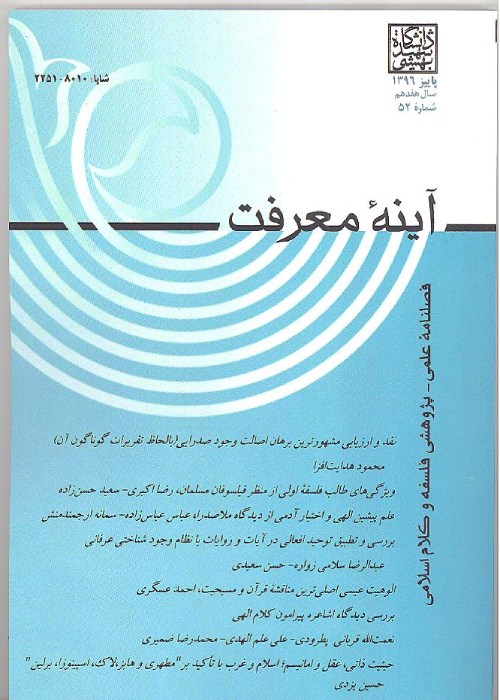Detachment of Imagination and its philosophical and Theological Requirements
Author(s):
Abstract:
From the Peripatetic philosophy perspective, imagination is a faculty dwelling in the vaporous spirit which has a materialistic but intangible nature. Accordingly, imaginal forms are material things and initiated somewhere in the brain. Arguing that it is impossible for something accessible to accommodate something inaccessible, Sohravardi opposes this statement stating that imaginal forms dwell in the world of ’images in suspense’ which is somewhere between the material world and the world of Platonic ideas. He also considers imagination a material faculty which is just a condition for viewing the imaginal forms and not a location for those forms. In speculative Sufism, the world of ‘images in suspense’ that is imagination is called the ‘connected or limited archetypal world’ in the human body which is the shadow of the ‘disconnected or absolute archetypal world’ that is the world of Platonic Ideas. On the basis of the foundations of transcendent theosophy, the theory of ‘trans-substantial motion’ and the ‘union of the knower and the known’, Mulla Sadra for the first time argued for the immateriality of imagination and used this notion to explain issues such as the corporeal resurrection, the nature of revelation, and dream vision. In the present article we first refer to the views expressed in the Peripatetic philosophy, Illuminative philosophy and Speculative Mysticism on the immateriality of imagination. We next explain the ontological and psychogenetic bases of transcendental theosophy of Mulla Sadra so far as they are deemed necessary for understanding the immateriality of imagination. The classification and discussion of Mulla Sadra’s arguments will follow. We then conclude the article with the implications of this notion for explaining a number of concepts such as the soul creativity, corporeal resurrection, imaginal world, revelation, dream vision, transcendent esoteric commentary, and the relation between the body and soul. Our view is that the notion of the immateriality of imagination, with its solid foundation and strong arguments is potentially capable of dealing with very important philosophical issues.
Language:
Persian
Published:
Ayeneh Marefat, Volume:6 Issue: 15, 2008
Page:
67
magiran.com/p694720
دانلود و مطالعه متن این مقاله با یکی از روشهای زیر امکان پذیر است:
اشتراک شخصی
با عضویت و پرداخت آنلاین حق اشتراک یکساله به مبلغ 1,390,000ريال میتوانید 70 عنوان مطلب دانلود کنید!
اشتراک سازمانی
به کتابخانه دانشگاه یا محل کار خود پیشنهاد کنید تا اشتراک سازمانی این پایگاه را برای دسترسی نامحدود همه کاربران به متن مطالب تهیه نمایند!
توجه!
- حق عضویت دریافتی صرف حمایت از نشریات عضو و نگهداری، تکمیل و توسعه مگیران میشود.
- پرداخت حق اشتراک و دانلود مقالات اجازه بازنشر آن در سایر رسانههای چاپی و دیجیتال را به کاربر نمیدهد.
In order to view content subscription is required
Personal subscription
Subscribe magiran.com for 70 € euros via PayPal and download 70 articles during a year.
Organization subscription
Please contact us to subscribe your university or library for unlimited access!


